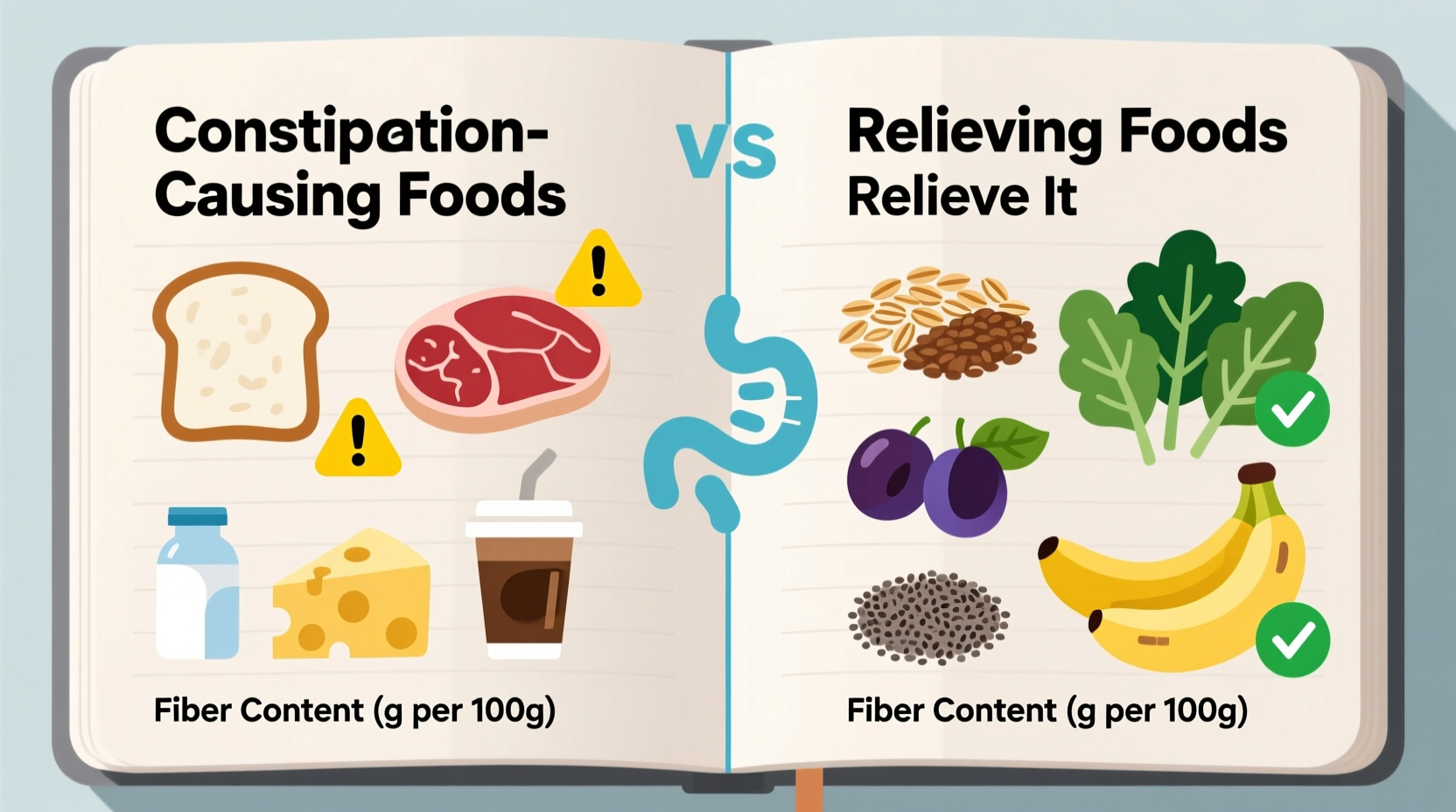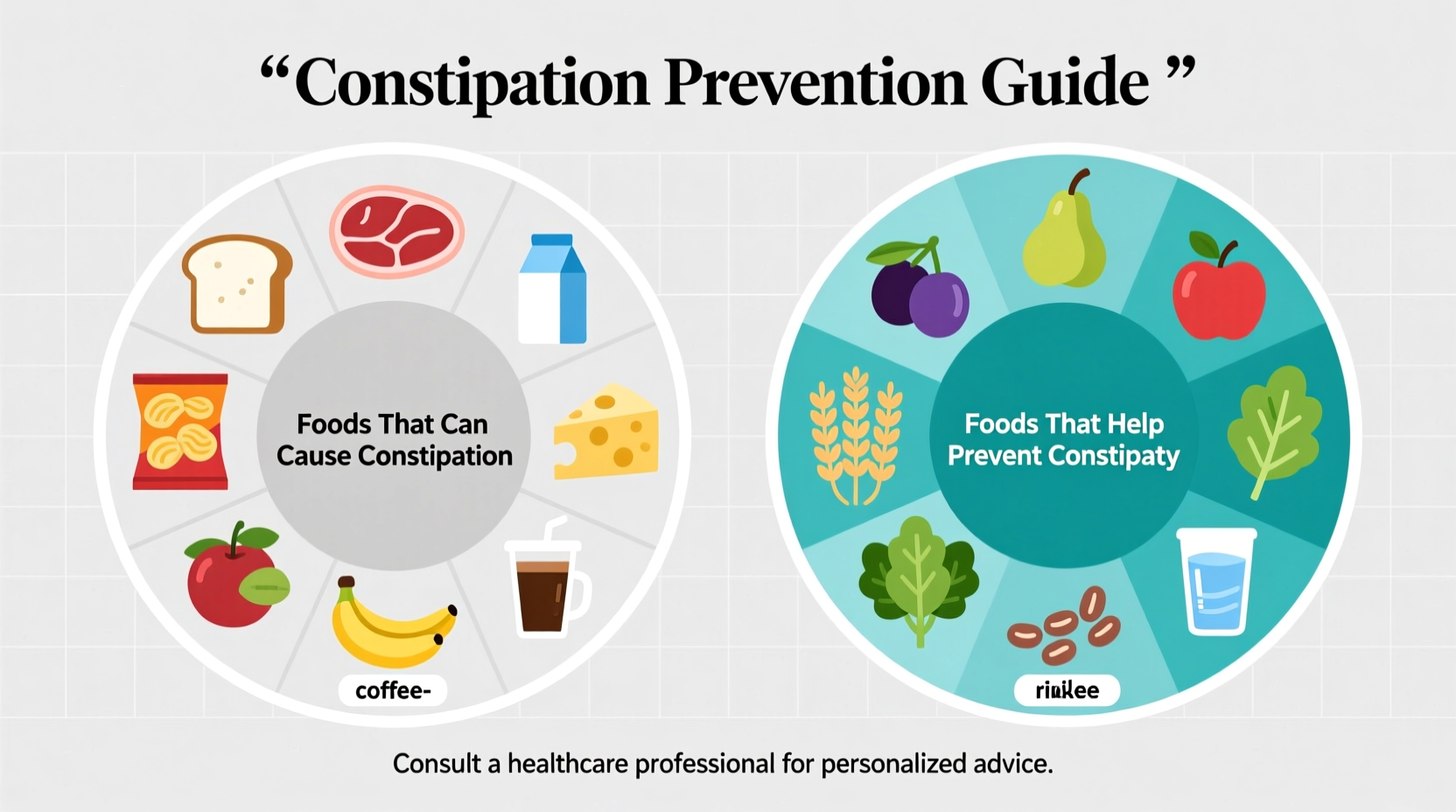Struggling with occasional constipation? You're not alone. Nearly 16% of adults experience constipation symptoms regularly, according to the National Institute of Diabetes and Digestive and Kidney Diseases. While fiber intake and hydration often take center stage in digestive health discussions, certain foods can actually contribute to constipation. Let's explore which foods might be slowing your digestion and what you can do about it.
The Science Behind Food and Constipation
Constipation occurs when waste moves too slowly through your digestive tract, resulting in hard, dry stools that are difficult to pass. While inadequate fiber and fluid intake are primary culprits, specific foods can exacerbate the problem by:
- Slowing intestinal motility (movement)
- Binding water in the digestive tract
- Lacking sufficient fiber to promote regular bowel movements
- Causing individual food sensitivities
It's important to note that food reactions vary significantly between individuals. What causes constipation for one person might not affect another due to differences in gut microbiome, digestive enzyme production, and overall health status.
Foods Most Likely to Cause Constipation: Evidence-Based Analysis
| Food Category | Why It Causes Constipation | Scientific Evidence | Better Alternatives |
|---|---|---|---|
| Dairy products (especially cheese) | High in casein protein which slows digestion; lactose intolerance affects 65% of adults globally | NIH study links dairy consumption to increased constipation risk in sensitive individuals | Almond milk, lactose-free dairy, fermented dairy like kefir |
| Unripe bananas | High in tannins and resistant starch which bind stool | Mayo Clinic research shows unripe bananas can worsen constipation while ripe ones help | Ripe bananas, prunes, pears |
| Red meat | Low in fiber, high in fat which slows intestinal transit time | Gastroenterology research indicates high meat consumption correlates with slower bowel movements | Fish, poultry, plant-based proteins |
| Fried and fast foods | High fat content delays gastric emptying; low fiber content | CDC dietary surveys show correlation between processed food consumption and digestive issues | Grilled, baked, or steamed preparations |
| White bread and processed grains | Stripped of natural fiber during processing | Harvard School of Public Health confirms whole grains promote regularity while refined grains do not | Whole wheat bread, oats, quinoa |
Why Individual Responses Vary: The Gut Microbiome Factor
Recent research published in Nature reveals that individual gut microbiome composition significantly affects how we process different foods. Two people eating the same constipation-triggering food may have completely different digestive responses based on their unique bacterial makeup.
This explains why:
- Some people tolerate dairy without issues while others experience immediate constipation
- Unripe bananas affect certain individuals more severely than others
- Red meat causes problems for some but not all consumers
When Food Isn't the Primary Culprit: Other Constipation Factors
While certain foods can contribute to constipation, they're often not the sole cause. Consider these additional factors:
- Inadequate hydration: You need sufficient water for fiber to work effectively
- Sedentary lifestyle: Physical activity stimulates intestinal contractions
- Medication side effects: Opioids, some antidepressants, and iron supplements commonly cause constipation
- Ignoring bowel urges: Suppressing the urge can weaken signals over time
- Underlying health conditions: IBS, hypothyroidism, or diabetes can affect digestion
Practical Strategies for Better Digestive Health
Rather than eliminating entire food groups, implement these evidence-based approaches:
- Practice the 80-20 rule: Enjoy potential trigger foods in moderation while focusing 80% of your diet on constipation-preventing foods
- Balance your meals: Pair moderate amounts of constipation-triggering foods with high-fiber options (e.g., cheese with whole grain crackers and fruit)
- Track your triggers: Keep a food and symptom journal for 2-4 weeks to identify your personal constipation triggers
- Stay hydrated strategically: Drink water throughout the day, especially when consuming higher-fiber foods
- Time your meals: Avoid large portions of potential trigger foods at dinner when digestion naturally slows

When to Seek Medical Advice
While occasional constipation is normal, consult a healthcare provider if you experience:
- Constipation lasting more than 3 weeks
- Severe abdominal pain
- Blood in your stool
- Unexplained weight loss
- Sudden changes in bowel habits
These symptoms could indicate underlying conditions that require medical attention rather than dietary adjustments alone.
Creating Your Personalized Constipation Prevention Plan
Instead of following generic advice, develop a tailored approach:
- Identify your personal trigger foods through elimination and reintroduction
- Gradually increase fiber from diverse sources (fruits, vegetables, whole grains, legumes)
- Establish regular meal and bathroom routines
- Incorporate movement throughout your day, especially after meals
- Monitor your hydration with a simple urine color check (pale yellow indicates proper hydration)
Remember that digestive health is highly individual. What works for others might not work for you, and that's perfectly normal. The key is understanding your body's signals and responding appropriately.
Can drinking coffee cause constipation?
Coffee typically has a mild laxative effect for most people due to its stimulation of colonic activity. However, excessive coffee consumption can lead to dehydration, which may contribute to constipation. The key is moderation and balancing coffee intake with adequate water consumption.
How long after eating constipation-causing foods might symptoms appear?
Digestive transit time varies, but constipation symptoms from specific foods typically appear within 24-72 hours. The complete digestive process takes approximately 24-72 hours from ingestion to elimination, so tracking your food intake alongside symptoms is essential for identifying personal triggers.
Are there any fruits that cause constipation?
Yes, unripe bananas and persimmons (especially astringent varieties) can cause constipation due to their high tannin and resistant starch content. Fully ripe bananas, on the other hand, contain more soluble fiber which can help relieve constipation. Most other fruits like apples, pears, and berries generally promote regularity.
Does chocolate really cause constipation?
Dark chocolate in moderate amounts typically doesn't cause constipation and may even have mild laxative properties due to magnesium content. However, excessive consumption of milk chocolate, which is high in dairy and sugar, can contribute to constipation in sensitive individuals. The key factor is portion size and individual tolerance.
Can gluten cause constipation?
For people with celiac disease or non-celiac gluten sensitivity, gluten can cause various digestive issues including constipation. However, for most people without these conditions, gluten itself doesn't cause constipation. The issue often stems from replacing whole grain gluten-containing foods with refined alternatives that lack fiber.











 浙公网安备
33010002000092号
浙公网安备
33010002000092号 浙B2-20120091-4
浙B2-20120091-4